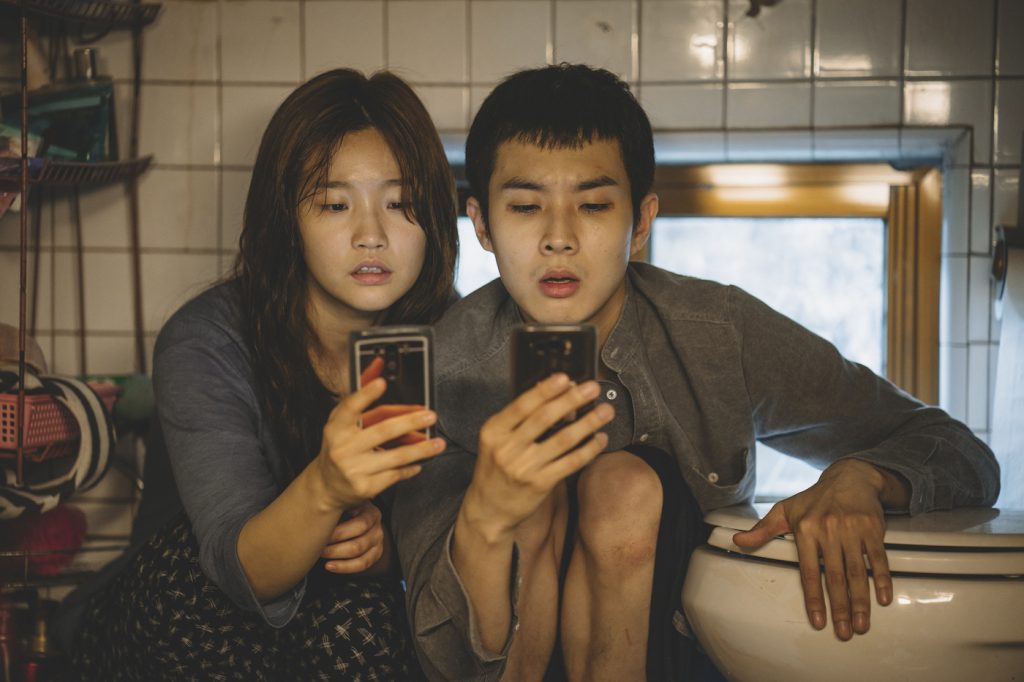TIFF 2019: Bong Joon-ho’s Parasite Gets Under Your Skin
There are no gentle super pigs (Okja), jellied roach bars (Snowpiercer), or colossal monsters (The Host), yet writer/director Bong Joon-ho’s Parasite manages to shock and surprise aplenty. There are dastardly deeds, masterful performances, and diabolical twists. The film reminds you that there is a very, very good reason this South Korean auteur is considered one of the best filmmakers alive; only he seems capable of making these movies. The crowd at the Toronto International Film Festival was lined up around several blocks to catch Joon-ho’s latest, and they were not disappointed, nor above sitting in the aisles to catch this oversold screening.
The plot is deceptively simple. Parasite is a story of class warfare, filtered through Joon-ho’s inimitable lens. The writer/director (he co-wrote the script with Jin Won Han) has called his film “a comedy without clowns and a tragedy without villains,” which sums it up better than I could. The aforementioned class warfare is waged between two families, the Kims and the Parks—with the latter being an unwitting combatant.
Joon-ho deploys perhaps his greatest special effect—legendary South Korean actor and longtime collaborator Song Kang-ho—as Ki-taek, the father of two deeply gifted, morally pliable children, twenty-something daughter Ki-jung (Park So-dam), and his son Ki-woo (Choi Woo-shik). Ki-taek is also the proud husband of Chung-sook (Chang Hyae-jin), and the Kim family are loving, miserably poor, and opportunistic in the extreme. Their basement apartment, overrun by stink bugs and menaced by a drunken neighbor who relieves himself right outside their kitchen window, is like a cluttered grave they’re desperately trying to crawl out of.

Then there are the fabulously wealthy Parks. The beautiful Yeon-kyo (Yeo-jeong Jo), her handsome husband Dong-ik (Sun-kyun Lee), and their two children, the teenage Da-hye (Ji-so Jung) and their little boy, Da-song (Hyun-jun Jung). They live in a gorgeous home, built and formerly occupied by a famous architect. Their house is a wonder of clean lines, glowing glass shelves, and dappled sunlight dancing in the garden and buttering their gleaming living room and expansive kitchen. They’ve got a housekeeper (Lee Jung-eun) who tends to their every possible need. She cooks, she cleans, she walks the dogs.

Soon enough a thread reveals itself and ties to the two families together. The Kim’s teenage son is told of a potential tutoring gig for the Park’s teenage girl (teaching her English). The only catch is he doesn’t have a college degree like the last tutor did. No bother, his sister simply forges some college papers with a little light photoshop work and voila, he’s a college grad. Mrs. Park is impressed by him and hires him immediately.
While he’s there on the job, he finds out that the Park’s young son has a bit of a behavioral problem, and could really use art therapy. Wouldn’t you know, he knows the perfect applicant, a young woman who happens to be an expert in art therapy. Should he make the introduction? He believes she’s in high demand, but perhaps she has an opening. What he doesn’t tell Mrs. Park is this expert is actually his sister, who doesn’t know the first thing about art, therapy, or art therapy. The game is on.
To tell you much more about the film would be to spoil its surprise (the director himself asked the audience if they would politely refrain from revealing pretty much everything that happens in the second half of the movie.) It’s enough to know that Joon-ho really meant it when he said that Parasite is a tragedy without villains. Yes, you could quibble with this statement (especially after the events in the film’s third act), but you can’t help but love the Kims, and, to Joon-ho’s immense credit, the super-rich Parks aren’t made out to be monsters, either.

Once the Kims get their hooks into the Parks with their ingenious scheming, you may find your allegiance wavering from time to time. That’s one of the most delightful things about Parasite; you’re not exactly sure how to feel. The performances are all so good, and the writing (as always in a Joon-ho film) is so crisp and often funny, you find yourself laughing and cringing simultaneously. The Kims are clever and loving, and quite hard-working, yet they’re horribly poor. The Parks are a little detached from reality (as one might become when your every need is met by a live-in maid), but they’re also loving and kind. The battle between the two families, one scheming and dreaming, the other unwitting and asleep, becomes painfully bittersweet.
Once the big twist comes, Parasite finally reveals the secret nested deep inside the story. The crowd at TIFF hollered and gasped at just the moments Joon-ho wanted us to. I’ve thought about the film ever since. My guess is Parasite will get under your skin, too.
Featured image: The Kim Family (Woo-sik Choi, Kang-ho Song, Hye-jin Jang, So-dam Park) in Parasite. Courtesy of NEON CJ Entertainment



